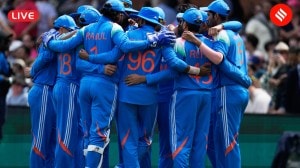The burden of the Oxbridge set
Montek Singh Ahluwalia and Mani Shankar Aiyar. The deputy chairman of the Planning Commission and the Union minister for Petroleum. Both alu...

Montek Singh Ahluwalia and Mani Shankar Aiyar. The deputy chairman of the Planning Commission and the Union minister for Petroleum. Both alumni of St Stephen’s College and Oxbridge, both English-speaking neo-Nehruvians. Decent, secular, committed to economic reform and perhaps the occasional Highland beverage. So far so good. Yet when we turn to the current political troubles of both Ahluwalia and Aiyar, another question arises: are the Oxford-educated idealists slightly out of touch with the realities of this country?
Both Ahluwalia and Aiyar are in the eye of two different storms. One faces the indignation of the Left, the other the wrath of the Right. Ahluwalia recently inducted “foreign experts” into consultative groups for the Planning Commission. In the midst of a noisy outcry and resignation threats from Left economists, those controversial groups have now been dissolved. Ahluwalia has had to bend before the government’s coalition partners and the onerous tag,‘World Bank man’, has been thrust on him more firmly. Just at a time when the Planning Commission was taking a stab at becoming relevant, in the course of an innocuous exercise like a mid-term review of a Plan, Ahluwalia created an unnecessary political crisis.
Mani Shankar Aiyar, for his part, has removed a plaque bearing quotes of Veer Savarkar from the Swatantra Jyot in Port Blair. As a direct result, the VHP burnt effigies of Aiyar and insisted that he tender a public apology. Both Ahluwalia and Aiyar have become the foci of controversy for the UPA government because frankly, in this instance, both have shown zero political horse sense. In fact, the controversies amplify the growing concern of the inability of the UPA government to manage the politics even as it pushes forward the policies. They illustrate the continuing inability of the educated class to vault over the walls of a seminar room and achieve a large-hearted rooted desi political presence.
Let’s examine the situation of Ahluwalia, the brilliant architect of Manmohanomics. He’s brought email to Yojana Bhavan and set the Planning Commission on course to becoming a paperless office. Yet computers and email on their own do not constitute the thing defined as a vision. They are simply managerial tools. After all, the Planning Commission is not an investment clearing board, instead it is supposed to stand for a vision of how the government has decided to spend the taxpayer’s money and create wealth and opportunity for all. If Ahluwalia has a vision for the Commission, he still hasn’t told the public what it is.
As deputy head of the Planning Commission, Ahluwalia can’t remain a well-meaning technocrat or the media’s blue-eyed boy. He’s not finance secretary anymore. His post is a political one and he must rise to the stature of a statesman, make moving speeches and carry everyone along in a large open-chested embrace. K.C. Pant and Madhu Dandavate — years earlier — may have been non-autonomous fuddy-duddies, but they were linked to a political process. To push forward the ambitious policies that the CMP has mandated him to do, the last thing that Ahluwalia needs to look like is a member of a high-flying set of global seminarists who jet in and out of countries, notching up the number of ‘Nations Advised’ on their CVs. Whatever the rights and wrongs of the “foreign experts” fracas, the fact is Ahluwalia completely failed to assess the politics of decision-making in a coalition government, in a situation where the UPA cannot afford to lose the Left.
When Ahluwalia invited McKinsey’s to be part of the now dissolved consultative groups, could he have failed to remember just what a political hot potato the firm is, considering it was Mckinsey’s who had devised the Vision 2020 Programme of Chandrababu Naidu which cost him an election? He cannot but be aware of the massive opposition to the ‘World Bank-IMF bogey’ that exists here — an opposition he may not approve of but one that he can’t wish away.
Here’s a suggestion from a taxpayer. The next time Ahluwalia gets the urge to invite exciting people to the Planning Commission, why does he not spread his net wider? Why does he not, for example, invite a few venerable sarpanches to speak, first hand, on whether the Tenth Plan is actually working or not in their zilas? Why not, in an audacious act of political innovation, invite representatives of the People’s War Group to speak on rural exploitation? Why not a tribal councillor from the Northeast to pour out his scorn on the finance ministry? How many individuals from the Northeast are represented in the Planning Commission anyway? Relying on the same ‘scotch and chicken tikka’ set who all talk more or less the same talk, hold interchangeable posts and attend the same seminars in international watering holes might become — and did become — a political mistake. If Ahluwalia was surprised by the resignation of his Left colleagues, then he’s guilty of a worrying lack of political foresight.
The same can be said for Aiyar. Whatever his personal beliefs on Savarkar, he unfortunately forgot that, as Union minister, he must embrace every Indian, some of whom adore Savarkar. How can a Union minister act like a Sahmat activist? Nehru didn’t balk at the Hindu Mahasabha being in his first cabinet. On the eve of Maharashtra elections, Aiyar’s handed the sangh a war cry, forgetting that this is not just a country of the poor but also the furious and the excluded.
May 2004 saw the return to politics of the “bush shirt” wearing middle class personified by Manmohan Singh. It would be a tragedy if these good folk failed to understand that a restless new India thirsts not only for bijli sadak and pani but also for self-respect, for inclusion, for a stake in the system, for a re-affirmation that India does not only work for the oligarchy at the top. In every qasbah and township, voters don’t just need food for the stomach; they also need succour for the soul. Clinton and Blair were famously excited by policy. But each worked never to lose the pulse of a crowd. In a country hungry for liberation from old hierarchies, mental and physical, the last thing Aiyar and Ahluwalia should aim to be are disconnected babalog armed with elite buddies and exclusive views.



- 01
- 02
- 03
- 04
- 05


























